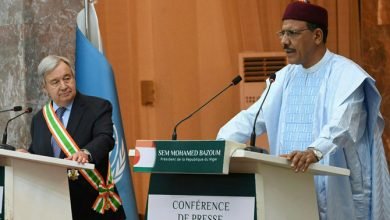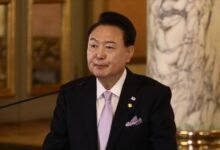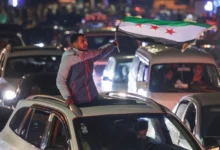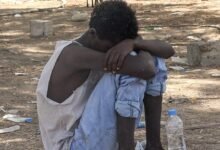international
Spain’s Sanchez offers Colombia help to reach peace with ELN rebels
[su_label type=”info”]SMA News – Agencies [/su_label][su_spacer size=”10″] Spanish Prime Minister Pedro Sanchez, on his first tour of Latin America since taking office in June, on Thursday offered any necessary support to push forward a peace deal between Colombia and ELN rebels.
Colombia’s new President Ivan Duque, who is evaluating whether to continue the peace talks, said in a joint news conference with Sanchez that he will happily consider Spain’s offer if rebels stop all violence and criminal activity.
“Anything Colombia needs from Spain to consolidate and advance peace we will say yes to. We will be with our Colombian brothers so that this will be a reality sooner rather than later,” leftist Sanchez said.
Sanchez is on a four-nation trip that began on Monday in Chile, one of five guarantor nations at the talks with the ELN currently taking place in Cuba.
In his inaugural speech on Aug. 7 right-wing Duque said he would review the negotiations, which began in February 2017, and make a decision within 30 days.
“If there’s a suspension of criminal activities, a will for peace, we very much welcome the offer that has been made by our good friend President Pedro Sanchez,” Duque said.
The ELN, founded by radical Catholic priests, has waged a five-decade war against the government, engaging in bomb attacks, kidnapping, extortion and sabotage of economic infrastructure like oil pipelines.
In an interview on Thursday with Spanish news agency EFE, ELN leader Pablo Beltran said the group was grateful for Spain’s offer of help.
Sanchez drew comparisons with Spain’s troubles with Basque separatist group ETA, which fought for independence from Spain in an armed conflict that stretched from 1959 to 2011.
“Spain has also suffered terrorist violence, has also suffered the migration of many people from certain regions of our country because of not switching to the ideology of the terrorist band,” he said.
The ELN is considered a terrorist organization by the United States and the European Union. ETA was also designated as terrorist group by the United States and EU.
Colombia’s long conflict, which also involves right-wing paramilitaries and crime gangs, has killed some 260,000 people and displaced millions. Colombia signed a peace accord in late 2016 with the bigger rebel group, the Revolutionary Armed Forces of Colombia (FARC).
Sanchez also praised Colombia’s “extraordinary” humanitarian efforts in helping Venezuelan migrants.
Colombia has borne the brunt of the exodus of hundreds of thousands of Venezuelans escaping hyperinflation and shortages of basic goods under socialist President Nicolas Maduro.
“I want to recognize the humanist commitment of President Duque,” Sanchez said.
He said the European Union would give Latin America 35 million euros to help with the crisis.
After a meeting in Lima on Thursday between Colombia, Peru and Ecuador, a Peruvian official said aid to countries taking in migrants from Venezuela must increase in tandem with the higher number of arrivals.
Latin American countries have repeatedly called on Maduro to enact democratic reforms and accept international aid.
Last week, the United Nations migration agency said the situation was building toward a “crisis moment” comparable to events involving refugees in the Mediterranean.
Sanchez next travels to Costa Rica.
Colombia’s new President Ivan Duque, who is evaluating whether to continue the peace talks, said in a joint news conference with Sanchez that he will happily consider Spain’s offer if rebels stop all violence and criminal activity.
“Anything Colombia needs from Spain to consolidate and advance peace we will say yes to. We will be with our Colombian brothers so that this will be a reality sooner rather than later,” leftist Sanchez said.
Sanchez is on a four-nation trip that began on Monday in Chile, one of five guarantor nations at the talks with the ELN currently taking place in Cuba.
In his inaugural speech on Aug. 7 right-wing Duque said he would review the negotiations, which began in February 2017, and make a decision within 30 days.
“If there’s a suspension of criminal activities, a will for peace, we very much welcome the offer that has been made by our good friend President Pedro Sanchez,” Duque said.
The ELN, founded by radical Catholic priests, has waged a five-decade war against the government, engaging in bomb attacks, kidnapping, extortion and sabotage of economic infrastructure like oil pipelines.
In an interview on Thursday with Spanish news agency EFE, ELN leader Pablo Beltran said the group was grateful for Spain’s offer of help.
Sanchez drew comparisons with Spain’s troubles with Basque separatist group ETA, which fought for independence from Spain in an armed conflict that stretched from 1959 to 2011.
“Spain has also suffered terrorist violence, has also suffered the migration of many people from certain regions of our country because of not switching to the ideology of the terrorist band,” he said.
The ELN is considered a terrorist organization by the United States and the European Union. ETA was also designated as terrorist group by the United States and EU.
Colombia’s long conflict, which also involves right-wing paramilitaries and crime gangs, has killed some 260,000 people and displaced millions. Colombia signed a peace accord in late 2016 with the bigger rebel group, the Revolutionary Armed Forces of Colombia (FARC).
Sanchez also praised Colombia’s “extraordinary” humanitarian efforts in helping Venezuelan migrants.
Colombia has borne the brunt of the exodus of hundreds of thousands of Venezuelans escaping hyperinflation and shortages of basic goods under socialist President Nicolas Maduro.
“I want to recognize the humanist commitment of President Duque,” Sanchez said.
He said the European Union would give Latin America 35 million euros to help with the crisis.
After a meeting in Lima on Thursday between Colombia, Peru and Ecuador, a Peruvian official said aid to countries taking in migrants from Venezuela must increase in tandem with the higher number of arrivals.
Latin American countries have repeatedly called on Maduro to enact democratic reforms and accept international aid.
Last week, the United Nations migration agency said the situation was building toward a “crisis moment” comparable to events involving refugees in the Mediterranean.
Sanchez next travels to Costa Rica.






